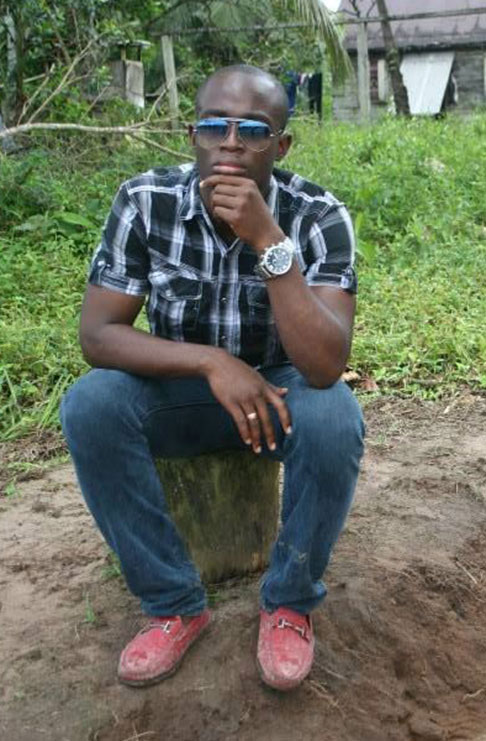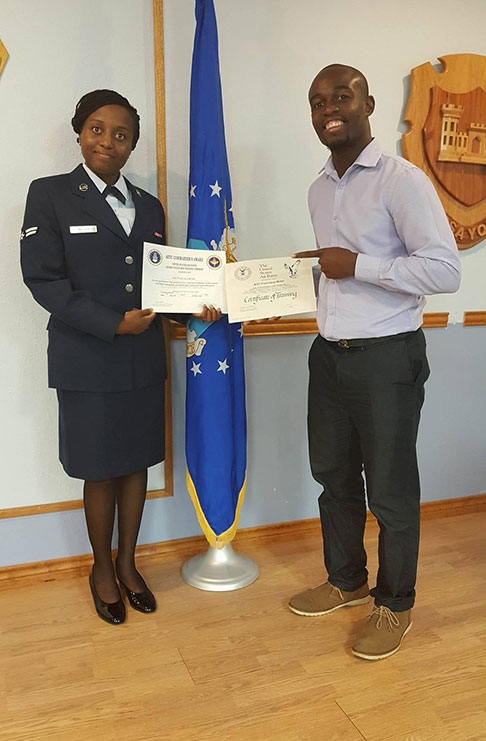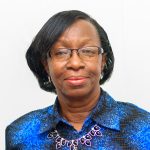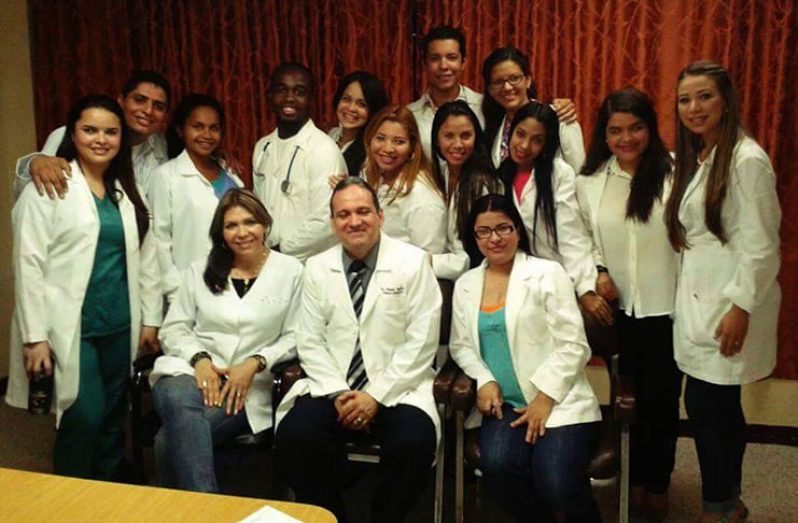–From growing up in Amelia’s Ward to graduating medical school in Venezuela
IT WAS truly a momentous occasion a few Tuesdays ago for 25-year-old Guyanese-born Orin Jamal Miller-Smith, domiciled in Venezuela for the last 16 years, when he graduated

from the Universidad del Zulia (LUZ) in Maracaibo as a Medico Cirujano (Medical Surgeon).
Throughout the ceremony, his parents, Yvette Smith and Orin Miller, and his two siblings, all of whom live in the United States, remained glued to the television, basking in the glory of his success, for they could not physically be with him.
Then came the eagerly awaited moment when Orin’s name was announced along with others who, like he, were finally graduating from medical school.
As he headed towards the stage to receive his certificate, there was an outpouring of emotions from his parents and siblings, for this was the moment he’d long been awaiting: The day he officially became a medical doctor.
And now, having done so, he’s required to do one year of rural service at an interior location in Venezuela, or a two-year internship in Professional Practice to get the experience he needs as a doctor working on his own.
MORE GOOD NEWS
Meanwhile, the family is also celebrating the success of Orin’s younger sister, Francesca Miller, who graduated with honours from the US Air Force in Civil Engineering, receiving in the process the Commander’s Coin.
Now a Civil Engineer in the US Air Force, Francesca also has to her credit an Associates Degree in Culinary Arts, as well as being a Certified Nursing Assistant II.

As for Orin, he also has a Diploma in Mental Health Intervention from LUZ.
At the tender age of nine, Orin, who hails from Amelia’s Ward, in Linden, his two siblings and their parents migrated to Venezuela to join their grandmother, an aging Venezuelan citizen.
There he continued his education, attending primary and later secondary schools, and doing well academically.
As he entered college, right from the beginning he knew that he was going to study medicine, for ever since he was a young child, he always showed an interest in doctors and their work.
If ever anyone was sick around him, he’d show deep concern, and always expressed a desire to help them, even if it was just to sit and look at them compassionately.
When he was just five, a family member was sick, and this troubled him so much he recalls waking up and crying one night, and asking his father why people had to die, and why couldn’t the doctors do something to help them.
“And so, as I grew up and came to understand more about sickness and death, I purposed in my heart that I would one day become a medical doctor and so embark on this noble mission of saving lives,” Orin said by telephone from Venezuela.

COLLEGE LIFE
After leaving secondary school, he entered college, where he was required to spend two years. And from that day, he embarked on a non-stop work regimen. He worked dedicatedly to ensure he got good grades, because he learnt quite early that getting into medical school in Venezuela was not easy.
Firstly, he would have had to complete both secondary school and college with good grades, and also passed a mandatory aptitude test, the Prueba de Aptituid Academica, which he did, ¡Gracias a Dios!
He was almost 18 when his parents received a call from the US Embassy, informing them that the processing of their documents for permanent residency had been completed. But the news was not so good for him, for he knew that nothing was going to get in the way of his medical studies.
He explored the options: Returning to Guyana to continue his education was possible, but he would have to pay for his programme of studies at the University of Guyana; the same held true for attending university in the United States of America if he didn’t get a scholarship. But it was different in Venezuela.
“Education in Venezuela, from Nursery to University is completely free. But as it is free, so is it highly competitive to get into certain high demanding careers, and medicine was one such,” Orin told the Sunday Chronicle.
That apart, the private universities in Venezuela do not offer careers in medicine, so one really had to be a high-flier throughout the health education system to be admitted to LUZ’s Faculty of Medicine.
The part he was required to play would be to put his shoulders to the wheel, study diligently, and score and maintain the grade point average to qualify for entry to University. His parents took the responsibility of supporting him financially throughout university.
HEART’S DESIRE
In 2009, at age 18, he got his heart’s desire: He was accepted to pursue studies at LUZ. Given a basket of options (Cesta de Opciones) from which to choose, he settled for Pure Chemistry (Quimica Pura) but subsequently took a transfer to the School of Medicine in the same Faculty of Science.
Then came the day he and his parents and siblings would have to part. At the airport, he kissed his parents goodbye, and promised them he’d be a responsible young man; that he’d work and study real hard, not only for himself, but for them as well.
That was a defining moment for him, Orin recalled. Initially, he was not altogether sure what the furture held; all he knew was that he was going back to a house that would no longer be the same without them. He’d now have to cook, clean, and launder for himself. He’d also have to stick to a rigid study schedule and, essentially, be on time for school.
“Initially, it was very challenging, but I made out; my parents trained me well, to get myself sorted, and to do little things in the home. So I’d say that served me to good stead,” Orin said.
THE CHALLENGES
Recounting the ordeal he endured, Orin told of getting up at around 03:00hrs every day, regardless of the weather, so he seldom got sufficient sleep. He’d then walk to the bus stop and wait there until 05:00 hrs to be picked up by the university’s bus. The ride from his pick-up point to LUZ took between one to two hours.
That would go on for about four-and-a-half years until he was finally able to find an apartment about half-an-hour’s drive away from campus.
But despite the odds, he would forge on despite the odds, finding the time at intervals to play games such as football and chess, and to be involved in mental health stability and other mental health initiatives for which he won several trophies.
In addition to being a budding doctor, Orin was a practicing entrepreneur, as to augment his financial upkeep from his parents, Orin said he would sometimes do part-time jobs like construction work or selling ice-cream, doughnuts and bread at school.
And commenting on his performance and what his professors thought of him, Orin modestly replied: “In 90 per cent of the time, I was very confident and in the next 10% I was a bit worried about what professor would think of me. They’d make it clear to you: ‘I expect a lot from you; in final or partial exams.’
“Sometimes they’d be very hard on you and would even make you cry. Professors prepare you to become their colleagues in the future.
“In medicine, all professors are doctors, so they are preparing you to be a doctor in the next few years, and there’s no joking about that.
“They’d take you into a room with the patient and ask what criteria you used for making your diagnosis; grade you on how you dress; what you do; how you treat the patients among other things.”
He also told of his being instrumental in getting one of his cousins from Linden, who was stricken with scoliosis of the spine, to travel to Venezuela where she was treated by some of the best surgeons in the country and other medical practitioners. Throughout her sickness, she was unable to walk upright, but after being treated, she was able to walk, Orin said.
And on a lighter note, Orin shared with the Sunday Chronicle that shortly after beginning his medical studies at LUZ, he met the love of his life, Yndrys Noelia Martinez, a pretty Venezuelan señorita who, a few years later, gave to him his greatest Easter gift ever: A blue Bundle of Joy!
In closing, he sought to express gratitude to God for his guidance and providence along the way; to his parents for their love, encouragement and support along the way; his fiancée and all his friends in Venezuela who helped him along the way; and his teachers back home at Republic Avenue Nursery, Kara Kara Primary and Regma Primary Schools in Linden.





.jpg)








